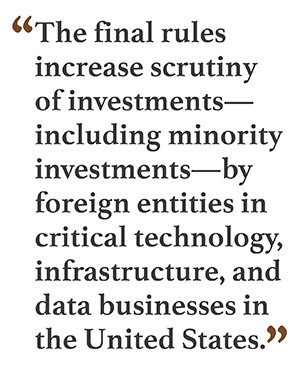 (L to R) Morgan Lewis' KennethNunnenkamp and Giovanna M. Cinelli; Christian C. Davis at AkinGump. Courtesy photo.
(L to R) Morgan Lewis' KennethNunnenkamp and Giovanna M. Cinelli; Christian C. Davis at AkinGump. Courtesy photo.
Long-awaited final rules from the U.S. Treasury Departmentgoverning national security reviews of foreign investments in U.S.companies were issued Monday. Executives at a broad spectrum ofcompanies involved in technology, infrastructure, and data "shouldbe aware of these changes, particularly the expanded jurisdictionof CFIUS [the Committee on Foreign Investment inthe United States] and mandatory reporting requirements," saidChristian Davis, an international trade partner at Akin, Gump, Strauss, Hauer & Feld inWashington, D.C.
|The regulations require mandatoryfiling for review by CFIUS, an interagency panel chaired by theTreasury secretary, for investments in either of two categories:First, certain foreign government–backed investments in U.S.businesses and, second, certain foreign investments in criticaltechnology companies. Most filings remain voluntary,however.
|"Anyone with pie-in-the-sky hopesof dramatic changes from September [when the draft rules wereissued] was probablydisappointed," said KenNunnenkamp, internationaltrade and national security partner at Morgan, Lewis &Bockius in Washington,D.C.
| "This is the new paradigm, andthere's still more to come on penalties, definitions, and fees," hesaid. "The venture capital community was introduced to this newworld in September, and it is not going away."
"This is the new paradigm, andthere's still more to come on penalties, definitions, and fees," hesaid. "The venture capital community was introduced to this newworld in September, and it is not going away."
The final rules hewed closely tothe draft rules proposed last fall.The final regulations take effect February 13 and were enacted underthe Foreign Investment Risk Review Modernization Act of2018.
|The final rules significantly extend the power of the CFIUS toreview private equity and minority-stake, non-controllinginvestment deals involving foreign entities and persons, in thecommittee's search for national security threats. As always, thepanel can require modification of deals or not approvethem.
|But the Treasury Departmentexcluded from the new regulations most deals from Australia,Canada, and the United Kingdom, unless there is a concern aboutforeign control of the acquiring companies.
|"The only countries that areinitially eligible for exemptions are the U.K., Canada, andAustralia. As a result, most investors will be subject tothe new expanded jurisdiction of these rules," Davissaid.
|MarioMancuso, partnerat Kirkland &Ellis and leader of itsinternational trade and national security practice, said in anemail, "The selection of the U.K., Australia, and Canada as thefirst 'excepted foreign states' is not surprising in light of theirshared security perspectives and interests. With that said, it'simportant to note that not every investor from one of thesecountries will be exempt from CFIUS's jurisdiction, and theexemption applies only to certain non-controlling investments andreal estate transactions. In other words, the CFIUS calculus fortraditional M&A will not materially change as a result of thisaction."
|Anne Salladin, a partnerat Hogan Lovells in its regulatory practice group, said, "It's anew concept, and we will have to see how it plays out goingforward." She added, "I would call it a bit of a test run, and itis a totally new concept for this committee."
||
Who Wins? Who Loses?
Mancuso said U.S. private equityinvestors would likely benefit from the new proposed definition of"principal place of business," which, he said, "provides importantclarity on when investments by U.S.-controlled funds throughnon-U.S. fund vehicles may be subject to CFIUS's legaljurisdiction."
|The final rules also expandreviews of real estate transactions locatednear military installations, airports, and maritime ports. The realestate transactions are not subject to a mandatory declarationrequirement, but urban areas aren't completely exempt.
|GiovannaCinelli, leader of theinternational trade and national security practice at Morgan Lewis,said the Treasury Department resisted calls from some trade groupsfor the new regulations to narrowly define "national security."Instead, she said, the department "confirmed its longstanding approach that thereis no set definition of national security and it wouldn't beappropriate to come up with a standingdefinition."
|The final rules increase scrutinyof investments—including minority investments—by foreign entitiesand persons of the U.S. in critical technology, infrastructure, anddata (TID) businesses in the United States, including thosehandling specific types of sensitive personal data on more than 1million U.S. residents, which could include big insurers andfinancial services companies among manyothers.
|"While CFIUS did build in somenew exemptions to these filing requirements, parties will need toensure that they are complying with these rules in the context oftransactions going forward," Davis said.
|Nunnenkamp said, "As a practicalmatter, all transactions where foreign money is coming in must dothis analysis up front," especially with respect to TIDtransactions.
|The Treasury Department said itwould publish separate proposed regulations regarding filing feesand penalties at a later date.
|Direct investment in U.S.companies from China, in particular, has declined dramaticallysince 2016, plunging from more than $46.5 billion that year toabout $3.1 billion in 2019, not solely because of CFIUS rules andU.S.-China trade battles, but also because of internal factors inChina, according to the Rhodium Group, a research organization.Venture capital from China into U.S.companies alsodeclined last year to thesmallest level since 2015, according to data fromRefinitiv.
|Signs of a possible thaw inU.S.-China trade tensions recently have appeared, however. TheTreasury Department also announced Monday its intentionto lift its designationof China as a currency manipulator. And the two countries signed a "Phase One" compromise trade dealWednesday.
|In a statement,Treasury Secretary Steven Mnuchinsaid of the CFIUS rules: "These regulations strengthen our nationalsecurity and modernize the investment review process and alsomaintain our nation's open investment policy by encouraginginvestment in American businesses and workers, and by providingclarity and certainty regarding the types of transactions that arecovered."
||
From: CorporateCounsel
|
Complete your profile to continue reading and get FREE access to Treasury & Risk, part of your ALM digital membership.
Your access to unlimited Treasury & Risk content isn’t changing.
Once you are an ALM digital member, you’ll receive:
- Critical Treasury & Risk information including in-depth analysis of treasury and finance best practices, case studies with corporate innovators, informative newsletters, educational webcasts and videos, and resources from industry leaders.
- Exclusive discounts on ALM and Treasury & Risk events.
- Access to other award-winning ALM websites including PropertyCasualty360.com and Law.com.
*May exclude premium content
Already have an account? Sign In
© 2024 ALM Global, LLC, All Rights Reserved. Request academic re-use from www.copyright.com. All other uses, submit a request to [email protected]. For more information visit Asset & Logo Licensing.







